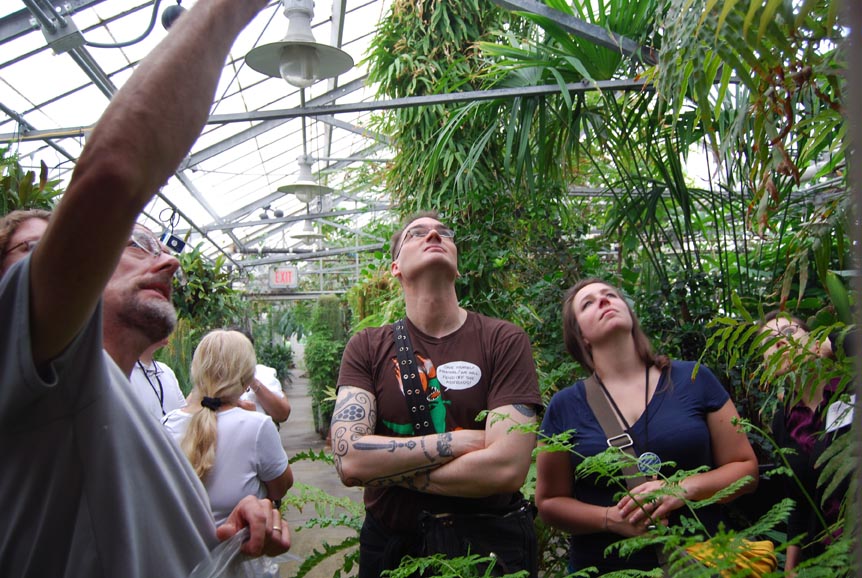
Scott Martin from the University of Michigan and Lauren Olewnik from Castleton State College listen to Clinton Morse’s description of a plant in the greenhouse.
The South African “Bug Plant, Fly Bush,” is a carnivore…of sorts. Unlike the better-known carnivorous Venus Fly Trap that closes on its prey and digests the insects who are unlucky enough to land on them, this plant has sticky hairs that trap insects, but doesn’t eat them because it lacks the enzymatic activity needed to digest them. Enter the aptly named assassin bug, Pameridea marlothi, with whom it enjoys a symbiotic relationship. The assassin bug moves freely about the plant – unhindered by the sticky hairs – and happily eats the trapped insects.
This was just one of the observations shared by Clinton Morse, the manager of growth operations for Ecology & Evolutionary Biology, who led a group of science librarians through UConn’s nationally known greenhouses as part of “New England Science Boot Camp.” The camp, a two-and-a-half-day educational event was hosted by UConn from June 11-13, and drew 67 participants from New England and well beyond. In addition to the tour of the greenhouses, faculty from UConn and other universities in the northeast, provided overviews and information on the latest research on the event’s featured topics: computer science, evolution, and pharmaceutical science.
One of the librarians in attendance, Scott Martin, the Bioscience Librarian at the University of Michigan has an undergraduate degree in biology and a Master’s degree in Genetics, thoroughly enjoyed the greenhouse tour and exposure to the diversity of living plants. “Although Michigan has an arboretum and botanical garden, I support the research in the herbarium, which has preserved and dried specimens. Seeing them here has been a real treat!”
Among the many plants Morse pointed out to the group included: tea (camellia sinensis “the world’s most important caffeine beverage” whose many varieties — white, green, oolong & black – derive from this species but are processed differently after harvest; stevia, Stevia rebaudiana, a plant whose leaves are used as a sweetener and said to be hundreds of times sweeter than sugar; Egyptian cotton, Gossypium barbadense, which is actually native to Peru, and whose fruit contains seeds covered with cotton fibers.
In addition to this biodiversity tour of the public collections, Morse led some of the librarians on a tour of the research facility not open to the public.
Aside from learning about the latest developments in various scientific fields, participants discussed use of library resources, research information needs, data management practices, and suggested new ways in which librarians can support their research communities.
Hosted each summer on a different New England campus, the casual ambience of Science Boot Camp promotes learning and camaraderie among librarians from New England and beyond.
According to Carolyn Mills, the Libraries’ Biology, Agriculture & Natural Resources Librarian and prime organizer of the event: “Science Boot Camp is held each year to give science librarians access to science topics from the viewpoint of researchers, and also to meet and network with other science librarians while having as much fun as possible. Boot camp at UConn was a big hit this year. The campers really enjoyed the friendly welcoming campus, the greenhouses, and the researchers they met! It made me proud to work at UConn.”
Those interested in learning more may view the presentations online, which are expected to be available sometime in July, at the New England eScience Portal: http://esciencelibrary.umassmed.edu/
